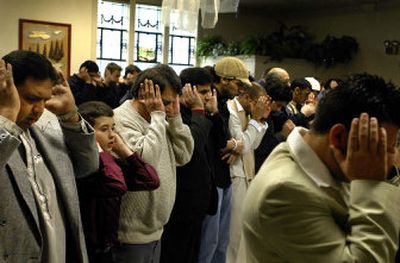Son’s recovery brings joy to Muslim holy day

As he lay prostrate on the ground – worshipping Allah on the sacred day of Eid al-Adha – Abdul Jabar Momand wept with gratitude.
“God gave me a very big gift,” he later said. “A miracle. God gave me a miracle.”
Just three weeks ago, Momand’s son, Barialay, was in a coma after suffering from carbon monoxide poisoning. He wasn’t expected to live. But five days after the Dec. 6 accident, the 20-year-old opened his eyes. About a week later, he began to talk again.
And on Saturday morning, the beginning of the most significant holiday in the Muslim calendar, Barialay joined his family and fellow Muslims at a community celebration in north Spokane.
“I feel happy to be alive,” Barialay said in a quiet voice.
The young man was surrounded by family and friends at the Corbin Senior Center, where more than 200 Muslims gathered for Eid al-Adha, a three-day feast that commemorates Abraham’s obedience to God and marks the end of the hajj or pilgrimage to Mecca. Also known as the Feast of the Sacrifice, the holiday is a time of joy and renewal for all followers of Islam, but this season’s celebration was especially significant for the Momand family.
“God gave my son a new life,” said an emotional Abdul Jabar Momand. “He is born again.”
Barialay and his friend, 18-year-old Faisal Asef, were found unconscious this month inside a vehicle in the Momands’ one-car garage in northeast Spokane. The two men, both students at Spokane’s Rogers High School, had been working on Barialay’s car. When they got cold, they decided to turn on the engine to stay warm. The garage door was closed, and the two were later overcome by carbon monoxide fumes.
Asef is still recovering at St. Luke’s Rehabilitation Institute, said Kahar Momand, the oldest of Abul Jabar Momand’s four sons. Barialay is back to normal, he said, although he still has to go to St. Luke’s three times a week.
“Faisal is attempting to get up on his own, but he is still very weak,” said Nina Kravtsova, a family friend. “Barialay is great and making wonderful progress. He didn’t smile much at first, but he’s now telling jokes again.”
On Saturday, the Momand brothers and their parents joined other Muslims in a prayer of thanks.
“This is a time for Muslims to come together,” said 17-year-old Adnan Shabir, a native of Kashmir. “It’s a day of unity and a time to thank God for all that we have.”
For about an hour Saturday, the women and men in separate rooms repeatedly stood, knelt and bowed in the direction of Mecca – palms, knees, and forehead against the white sheets that covered the floor.
“My brothers and sisters in Islam, today is the day of sacrifice,” proclaimed Mamdouh El-Aarag, president of the Spokane Islamic Center, in both English and Arabic. “Abraham was willing to sacrifice his son for the sake of Allah … It is a day to be happy. It is a day to forgive each other. … It is a day to give and be generous.”
Eid al-Adha is one of two “Eid” holidays celebrated by Muslims. Eid al-Fitr takes place after the holy month of Ramadan, a time when Muslims fast from sunrise to sunset. Eid al-Adha is a bigger celebration that focuses on Abraham’s willingness to sacrifice his son in order to follow God’s command.
Besides celebrating through worship and a shared meal, Muslims in the area usually observe the Feast of the Sacrifice by visiting old friends, donating food and money to the poor and other acts of charity, said Shariq Hamed, who is originally from the Republic of Seychelles.
For Serpil Perrin, of Post Falls, this Eid marked the first time she celebrated the holiday with other Muslims in the area. Although she was raised by a Muslim family in Turkey, Perrin didn’t practice her faith until after the events of Sept. 11, 2001, she said. At the time, some Americans and media outlets condemned Islam, she said, but their descriptions of the religion didn’t fit with what she had learned as a child from her grandmother. “Islam was always about peace, tolerance and love,” she said. After doing some research, she came back to the faith.
“It was the Quran,” Islam’s holy book, Perrin explained. “When I read it, I felt the presence of God.”
While some Eid celebrations around the world were jarred by the news of Saddam Hussein’s execution, which took place right before the holiday, there was little discussion about the former Iraqi leader among Muslims in Spokane. It’s a shame that it had to happen at the beginning of Eid, some said, but Hussein’s execution was more of a political event rather than a religious one.
Most Muslims in the Spokane area seemed far more concerned with holiday preparations and giving thanks for the blessings in their lives.
“Il-hamdulilah,” Abdul Jabar Momand said in Arabic, describing his reaction to his son’s recovery. “Thanks be to God.”
The 52-year-old left his home near Jalalabad, Afghanistan, 17 years ago. He ended up raising his family in Uzbekistan, where he worked as a radio announcer translating Russian-language news into his native Pashto and Dari. In 2003, the family was able to seek asylum in Spokane.
“We are so happy,” he said, as he put his arms around his children. “This is a double Eid.”